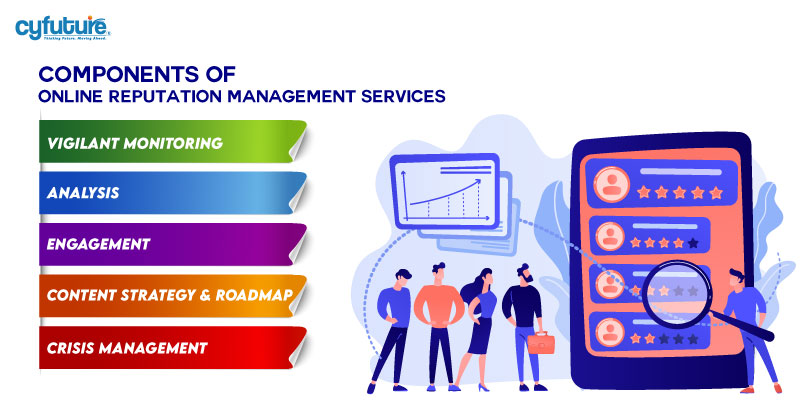-
Get Cloud GPU Server - Register Now!
Toggle navigation

The digital world of today is evolving quickly, and your brand’s reputation is both precious and fragile. As the reliable digital steward of brands, online reputation management (ORM) has emerged to expertly navigate the complex web of public image. This article examines the crucial function of online reputation management (ORM), breaking down its essential elements and explaining how the knowledge of reputation management specialists acts as a shield, preserving the integrity of your business in the vast and often turbulent world of the internet.
Information spreads quickly these days, so ORM is not only a must for brands that want to navigate the digital space with grace and tenacity but also a strategic imperative, assuring that their online image stays strong, positive, and resilient in the face of shifting online discourse.
To build your thought-leadership brand and improve your online awareness, you have to maintain a positive online reputation, regardless of whether you are the owner or manager of a small business, Fortune 500 organization, or multi-location enterprise. You have to do that by managing your online reputation.
Positive internet evaluations have been shown to increase customer confidence in businesses, with 74% of consumers reporting that they increase their trust in local businesses.
More than 50% of customers have claimed that unfavorable and negative reviews discouraged them from using a company’s products or services.
For 49% of customers, a company must have at least a four-star rating before they will utilize it.
Fundamentally, online reputation management is the process of redefining and influencing how the public views a person or business online. It includes a range of tactics and methods intended to establish, preserve, and mend a brand’s online image. Since social media, online reviews, and instant access to information have all had a major influence on how consumers perceive brands, the demand for ORM has increased dramatically.

A complex strategy called online reputation management (ORM) aims to control, monitor, and affect how people and organizations are seen online. Together, the elements of ORM help to establish, preserve, and restore a person, business, or brand’s online reputation. Now let’s take a look into the essential elements of a thorough strategy for online reputation management:
Vigilant monitoring is the fundamental component of every successful ORM approach. This includes monitoring mentions of content online on a variety of channels, such as news stories, social media, forums, and review sites. Both manual oversight and automated methods are used to monitor brand-related talks. Businesses are certain to be informed of any comments made against them in real time thanks to this ongoing surveillance.
Post monitoring, and a careful examination of the gathered data a necessary components of online reputation management services. Professional analysts analyze sentiment, spot trends, and determine how internet material affects a brand’s reputation. Beyond surface-level data, this study offers practical insights into the subtleties of public opinion.
An essential element of ORM is proactive engagement. Engaging with the audience through a variety of digital platforms is required for this and is a crucial step. Taking part in pertinent conversations, attending to consumer inquiries, and resolving problems all help to establish a favorable online profile. Brands may control the narrative surrounding them and show their dedication to customer satisfaction by actively engaging with the public. Organizations can form an alliance with business consulting firms that can provide effective engagement strategies.
In ORM, creating and sharing good content is a proactive approach. A strong content strategy involves creating and delivering material that promotes the brand’s advantages, principles, and achievements. This includes writing interesting articles, posting interesting material on social media, and optimizing website content for search engine rankings. The ideal image of the brand is reinforced and bad search results are pushed down by positive and authoritative material.
A clear crisis management strategy is an essential component of any successful ORM, as no brand is immune to it. This involves predicting possible problems, developing solutions, and implementing plans into action quickly to minimize the effects of negative events. Having a crisis management strategy is essential to sustaining brand resilience, whether it is for handling a public relations issue, handling social media backlash, or responding to unfavorable reviews.
Companies that offer products with a high number of positive reviews draw in more clients. This explains the significance of reputation management in the mostly digital world of today. Evaluations of your business and merchandise spread more quickly than word-of-mouth. This is the primary reason why you should spend money on ORM marketing for this reason. A high number of unfavorable reviews might hurt sales and ROI (return on investment). If you want assistance establishing or restoring your online reputation, engage with online reputation management companies or business consulting firms. Organizations that enjoy excellent internet reputations don’t need to invest more in advertising than those that don’t. This adds to the significance of reputation management.
Companies that monitor social media comments and reviews can increase their client loyalty. Resolving complaints quickly presents chances to build strong relationships with clients. Monitoring social media enables you to identify client moods and offer insightful answers. Increasing customer loyalty makes customers brand ambassadors who promote your company. Since it is impossible to monitor everything that occurs on the internet, it is essential to make use of software programs and the top online reputation management services.
Search Engine Optimization (SEO) depends on Online Reputation Management (ORM), which affects how often people see your brand in search engine results. Having a good internet reputation increases visibility and the possibility that people will find your brand while looking for goods or services. Reputable and pertinent material is given precedence by search engines, and having a good online reputation helps to show your brand prominently, attracting potential consumers and building trust, in addition to helping to push down unfavorable search results. Essentially, ORM works as a catalyst to raise your brand’s exposure on search engines, which is vital in the current digital environment.
The reputation of a brand on the internet has a big impact on both consumer and prospective employee impressions. While a bad internet reputation might turn away potential hires, a strong online presence attracts top talent and strengthens recruiting efforts. Positive organizational culture may be fostered by increasing employee pride in the workplace through the implementation of Online Reputation Management (ORM). By cultivating a positive online reputation, the company draws in qualified workers and positions itself as an employer of choice, which in turn creates a happy and driven staff that supports the company’s objectives and core values.
A good internet reputation becomes a key differentiator in the highly competitive industry, helping to establish your business apart from competitors. When given an option, consumers are prone to choose a brand with an excellent online reputation over rivals tarnished by negative reviews. Not only does a favorable digital image foster trust, but it also becomes a deciding element when making purchases. In the ever-changing universe of consumer options, it establishes your brand as the go-to option, giving it a clear competitive advantage that transcends product attributes, shapes consumer perceptions, and eventually fosters customer loyalty.
Social media management comprises curating and actively monitoring a brand’s social media presence. Offering ORM services ensures that the company stays loyal to its fundamental values and maintains an upbeat image. By means of deliberate content dissemination, attentive feedback, and proactive audience involvement, ORM mitigates the potential for issues to escalate on social media networks. In the dynamic realm of social media, this proactive approach not only safeguards the brand’s image but also fosters a robust and authentic connection with the audience, all of which contribute to the establishment of a positive and long-lasting online reputation.
The online reputation of a brand has a significant impact on both customer acquisition and retention. Maintaining a great online reputation is essential for drawing in new business and keeping hold of current clientele. When current consumers come across great testimonials, reviews, and an overall nice internet presence, they are more inclined to stick around. At the same time, prospective buyers heavily depend on internet reviews and ratings to guide their choices. A company that has a good internet reputation attracts new clients and is a very effective instrument for consumer acquisition. In summary, having a positive online presence helps maintain client loyalty and foster ongoing client base expansion.
Protecting your brand’s reputation is critical in the always-changing digital world, and online reputation management, or ORM, has become the skilled custodian of digital identities. By breaking down the essential components of ORM and demonstrating how the knowledge of reputation management experts serves as a barrier to protecting your company’s integrity in the broad internet space, this article has shed light on the crucial function that ORM plays. Positive internet reviews directly affect search engine exposure, client loyalty, and sales. In addition to improving brand image, ORM also helps businesses become more profitable, retain customers, and gain a competitive edge. The combination of strategic involvement, crisis management, and attentive monitoring creates a strong barrier against the unpredictability of the Internet.
With the speed at which information is propagated, ORM is becoming not just essential but also strategically critical for companies that want to successfully traverse the digital landscape. It guarantees that, despite evolving online discussions, your online image stays strong, upbeat, and durable. Whether you run a Fortune 500 company or a small firm, investing in ORM is an investment in long-term success and sustainability in the ever-changing online space. Working with business consulting organizations or online reputation management businesses may provide you with the know-how to create and manage a great online presence, which is essential for thriving in the digital age. Proactive ORM is essential to building the story around your business as the digital world changes more.
FAQs
Q1 Which organizations should opt for online reputation management services?
Answer: All organizations, regardless of size or industry, should opt for online reputation management (ORM) services. In today’s digital age, where information spreads rapidly, a positive online image is crucial for success. Small businesses, Fortune 500 companies, and multi-location enterprises can benefit from ORM to enhance brand perception, attract customers, and maintain a competitive edge. ORM is especially vital for businesses heavily reliant on online reviews, as positive feedback fosters customer trust. Additionally, organizations seeking to attract top talent, manage crises effectively, and ensure long-term sustainability in the digital landscape should prioritize ORM services.
Q2 What are the disadvantages of online reputation management services
Answer: While there are many advantages to online reputation management (ORM), there may also be drawbacks. It could be pricey, particularly if you need extensive procedures. Despite management attempts, malevolent or false reviews may continue to exist. A heavy focus on positive material might come off as fake and lose credibility. Since ORM cannot monitor every online discussion, it is difficult to solve every problem. Attempts to alter material on the internet may occasionally go against moral principles. Furthermore, ORM is unable to completely remove previously recorded unfavorable information. It may take some time to see results, and constant work is needed. Additionally, if ORM is overused, focus may be diverted from solving underlying business problems that fuel unfavorable opinions.
Q3 How business consulting firms can help your business in ORM?
Answer: Business consulting firms play a vital role in enhancing your business’s Online Reputation Management (ORM). They bring expertise in strategy development, crisis management, and effective communication. These firms analyze your digital footprint, providing actionable insights to shape a positive online image. By implementing proactive engagement strategies, they help mitigate potential issues and maintain a favorable reputation. Business consulting firms also guide businesses in crafting a robust content strategy and optimizing search engine visibility. Their holistic approach ensures that ORM aligns with broader business goals, fostering resilience and success in the dynamic digital landscape.